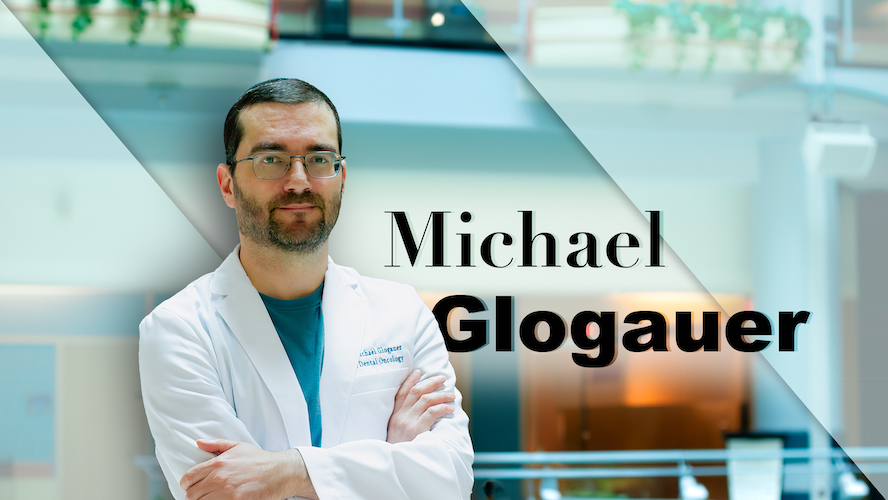
Safeguarding cancer treatment
When patients with head and neck cancers receive radiation therapy, they may develop oral health side effects including dry mouth, infections, loss of taste, and a red and sore lining of the mouth. To help mitigate these risks, patients are screened in the Dental Oncology Department before undergoing treatment—an important part of patient care at the Princess Margaret Cancer Centre.
“We are here to make sure that oral disease does not become a complication of the cancer therapy,” says Dr. Michael Glogauer, Dentist-in-Chief at UHN.
Michael also does research on how to make the experience of cancer treatment better for patients by keeping an eye on their oral health. He does this with the help of a type of immune cell called a neutrophil.
“We found in a study that neutrophil entry into the mouth is an excellent biomarker for determining the health status of the gums and monitoring oral health during cancer therapy. The presence of neutrophils tells us when there is a shift towards a disease pattern or pathogenic process.”
Previous research from Michael’s lab, published in Blood Advances, discovered a specific subset of neutrophils in blood circulation called primed polymorphonuclear neutrophils. These primed state neutrophils arrive at sites of inflammation and fight infections quicker than other resting-state neutrophils.
Just as oral neutrophils tell us about the health of patients with head and neck cancer, these ready-to-act neutrophils in the blood are also important for patients with leukemia who are getting bone marrow transplants. Michael’s team found that these blood cells can help identify patients likely to get blood infections post bone marrow transplants.
Improving Oral health beyond cancer
“Over the years, there has been more appreciation for how oral health impacts systemic health. Many health services and departments are now recognizing that oral health needs to be optimized in patients with certain conditions.”
Working with Drs. Adriana Luk and Phyllis Billia from the Peter Munk Cardiac Centre at UHN, Michael’s research team discovered that oral health may have a significant impact on the survival of patients who undergo heart transplants. The Dental Oncology Department works to ensure optimal oral health for these patients, making it a comprehensive dental unit serving a diverse range of patients within the UHN.
The team also implemented the use of a portable radiograph device to conduct dental examinations and perform certain procedures directly in the cardiac unit for patients who cannot be moved. This approach helps eliminate existing oral disease before surgery.
Another exciting area Michael researches is to understand the components of a healthy oral microbiome and how it varies from person to person.
“Some patients have to work really hard to maintain good oral health. Others, on the other hand, don’t need to put in too much work,” says Michael. “We're trying to understand what leads to this phenomenon.”
The team have identified specific strains of bacteria called Streptococcus salivarius SALI-10, that are critically important in maintaining good oral health. These bacteria, found in only 1% of population who are gifted with excellent oral health and resistance to dental disease, produce a new class of antibiotic-like molecules called phosphorylated lantibiotics, which can eliminate pathogens and regulate immune cells within the oral environment.
“We want to introduce these biotherapeutic bacteria to the oral cavity of patients who have to work very hard to maintain their oral health.”
In 2019, Michael co-founded a biotechnology company called Ostia Sciences, based on his discovery of salivarius SALI-10, to develop novel probiotics for the restoration of oral health.
Training the next generation of dental oncologists
“One of the things I love about a career in science is that it is all about making a difference and making discoveries in things that were previously maybe underappreciated.”
When Michael was in dental school, the field of dental oncology was in its infancy and there were no courses on how cancer experience impacts oral health.
“The education system in the past didn’t expose trainee dentists to this field,” says Michael, “That’s why, with Dr. Erin Watson, we started a course in 2020 at the Faculty of Dentistry that familiarizes dental students with the field and provides them with practical experience in our clinic.”
The team also set up a one-year dental oncology fellowship program where they train dental graduates on providing dental care to patients before, during, and after cancer therapy.
“Nowadays, thanks to advancements in cancer treatment, many patients are surviving cancer and their therapy. However, the disease and treatment still impact their oral health,” says Michael, “We need dentists who are familiar with these oral complications so that they can manage the situations appropriately.”
Meet PMResearch is a story series that features Princess Margaret researchers. It showcases the research of world-class scientists, as well as their passions and interests in career and life—from hobbies and avocations to career trajectories and life philosophies. The researchers that we select are relevant to advocacy/awareness initiatives or have recently received awards or published papers. We are also showcasing the diversity of our staff in keeping with UHN themes and priorities.




